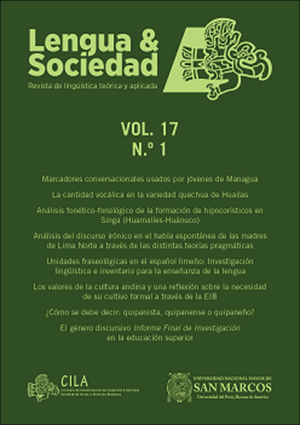Ironic Speech Analysis in the Spontaneous Speech of the Mothers of Lima North Through the Different Pragmatic Theories
DOI:
https://doi.org/10.15381/lengsoc.v17i1.22364Keywords:
Irony, mothers, Lima Norte, pragmatic theories, spontaneous speechAbstract
This article reveals the level of irony in certain manifestations that the mothers of Lima North possess in their spontaneous speech. For this, a questionnaire was made with eleven questions, which contain common information in communication between mothers and offspring; these are grouped according to common features and the most plausible pragmatic theories are applied to the analysis of the data. Likewise, a generalization of the data obtained is sought, based on the theories applied. It is concluded that the levels of irony practiced (consciously and unconsciously) by mothers are changing and will depend on the type of question they have been asked, because in some cases they do not use this resource. Also, rhetorical phrases and figures that accompany the figurative sense of ironic statements are considered.
References
Alvarado, M. (2005). La ironía y la cortesía: una aproximación desde sus efectos. ELUA, 19, 33-45.
Alvarado, M. (2006). Las marcas de la ironía. Interlingüística, 16, 1-11.
Anscombre, J. y Ducrot, O. (1983). La argumentación en la lengua. Madrid: Gredos.
Austin, J. (1962). How to Do Things with Words. Oxford: Oxford University Press. (traducción de Genaro R. Carrió y Eduardo A, Rabossi, Cómo hacer cosas con palabras, Barcelona: Paidós, 1998)
Berrendonner, A. (1981). Éléments de pragmatique linguistique. París: Éditions de Minuit. (traducción Elementos de pragmática lingüística, Barcelona: Gedisa, 1987).
Caro, M., Camargo, Z. y Uribe, G. (2018) La ironía re-visitada en sus dimensiones pragmáticas, comprensivas, discursivas y didácticas. Lenguaje, 46(1), 95-126.
Casas, J. (2017). Presuposición pragmática e ironía verbal: la cognición irónica (Tesis de maestría). Universidad Nacional Mayor de San Marcos, Lima.
Crespo, N., Benitez, R. y Caceres, P. (2007). La comprensión de las ironías orales. Estudios Filológicos, 42, 79-94.
Goubet, C. (2008). La ironía como recurso argumentativo-persuasivo en el discurso político de la prensa escrita. Cyber Humanitatis, 45. Recuperado de https://web.uchile.cl/vignette/cyberhumanitatis/cda/creacion_simple2/0,1241,scid%253d21719%2526isid%253d738,00.html
Haverkate, H. (1985). La ironía verbal: análisis pragmalingüístico. Revista Española de Lingüística, 15(2), 343-391. Recuperado de https://scielo.conicyt.cl/scielo.php?script=sci_arttext&pid=S007117132007000100005
Kocman, A. (2011). La ironía verbal como semejanza incongruente (Tesis doctoral).Universidad de Salamanca, España.
Levinson, S. (2000). The Theory of Generalized Conversational Implicature. Cambridge: Massachusetts.
Muecke, D. (1978). Irony markers. Poetics (7), 363-375.
Reyes, G. (2004). Pragmática y metapragmática: la ironía lingüística. En I. Lerner, R. Nival, & A. Alonso (Eds.), Actas del XIV Congreso de la Asociación Internacional de Hispanistas (Vol. 1, pp. 147-158). España: Centro Virtual Cervantes.
Ruiz, F. (2004). Principios cognitivos y pragmáticos del procesamiento y la comprensión. Arbor, 177(697), 128.
Ruiz, L. (2009). ¿Cómo se gestiona la ironía en la conversación?. Rilce, 25(2), 363-377.
Schmid, H.J. (2002). Cognitive Pragmatics. Berlin: De Gruyter Mounton. Sperber, D. y Wilson, D. (2004). La teoría de la relevancia. Revista de Investigación Lingüística, (7), 237-286.
Downloads
Published
Issue
Section
License
Copyright (c) 2018 Sandra Desiree Estrada Cubas, Mirella Alexandra Robles Muñoz

This work is licensed under a Creative Commons Attribution 4.0 International License.
AUTHORS RETAIN THEIR RIGHTS
a. Authors retain their trade mark rights and patent, and also on any process or procedure described in the article.
b. Authors can submit to the journal Lengua y Sociedad, papers disseminated as pre-print in repositories. This should be made known in the cover letter.
c. Authors retain their right to share, copy, distribute, perform and publicly communicate their article (eg, to place their article in an institutional repository or publish it in a book), with an acknowledgment of its initial publication in the journal Lengua y Sociedad.
d. Authors retain theirs right to make a subsequent publication of their work, to use the article or any part thereof (eg a compilation of his papers, lecture notes, thesis, or a book), always indicating its initial publication in the journal Lengua y Sociedad (the originator of the work, journal, volume, number and date).



























